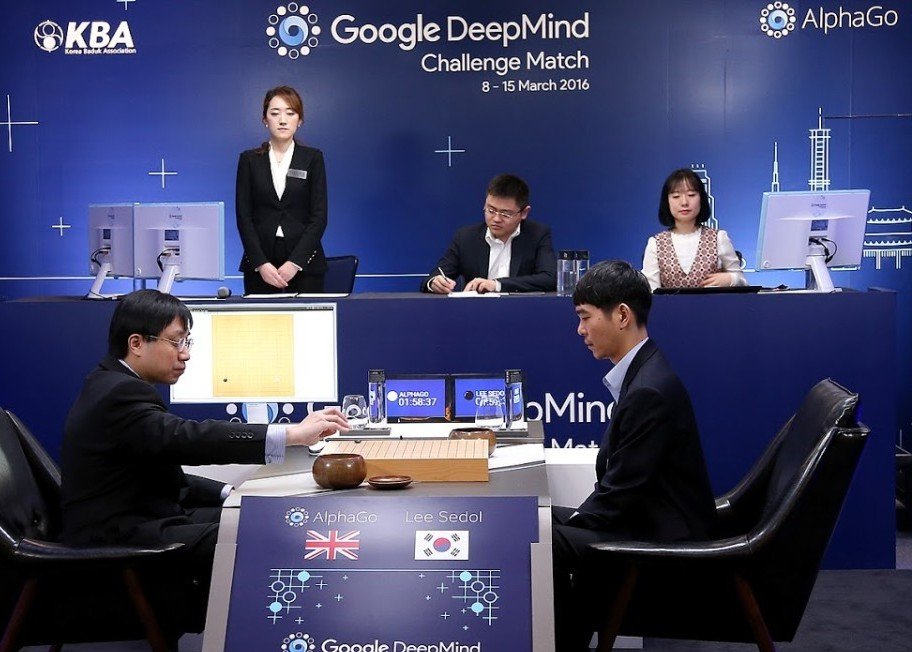
Heroes of a different kind: AlphaGo vs. Lee Sedol
I wanted this issue to revolve around the theme of "Heroes and villains", how these two stereotypes are often two sides of the same coin, depending on whose camp you're in. The inspiration came from Larry's article on one of two contrasting American generals, namely Curtis LeMay, active in World War II in both the European and Pacific theaters.
He was hailed as a hero for bringing the Japanese on their knees by his firebombing campaigns that were more deadly than the two nuclear bombs on Hiroshima and Nagasaki combined. The latter actions were actually also carried out on his watch. Why this makes him a hero? Because, according to the military logic of the time, this prevented the blood spilling of tens of thousands military personnel on both sides if Japan had to be conquered the way Germany had been, with an invasion and an arduous struggle to capture city by city, not to mention the possibility that Russia might do the same and carve out its own sphere.
But look at this from the Japanese side. He killed (or ordered to kill) millions of civilians. That makes him a mass murderer, right? He himself freely admitted that he would have been tried as a war criminal should Japan have won the war. Just like all the Japanese generals and politicians tried and executed as war criminals after the war ended. Yet he happily accepted a decoration from the Japanese government for helping their military reorganization after the war. Which, by the way, had led to nationwide protest rallies, a fact scarcely reported in the Western media. Uncustomary was also the fact that the honor was not delivered by the Emperor or any of his relatives, but by the cabinet of the Prime Minister, who hoped for better relations with the U.S. The people in the street surely never forgave him.
A hero for some, a criminal for others. The same theme can be found in some other articles, like Rick's kingmaking piece or Kevin's characterization of Machiavelli. But there's one more story, alas not expanded on separately in this issue (I did mention it in Facebook, though), an event from the current actuality that fits in the same mold . No, not the terrorist attack on Belgian soil (thanks for enquiring on my relatives' well-being), where the general public opines against the perpetrators of these atrocities, while their supporters call them martyrs for their cause, another form of heroism. I'm talking about a much more peaceful event, the victory of a computer, AlphaGo, against one of the very top Go professionals, the 30-something year old Korean Lee Sedol.
Go is as popular in East-Asian countries as chess is in the West. But in terms of move options it's a few factors more complex, making it unfit to be solved with the brute force techniques employed in computer chess. If you missed the event, read up on it or watch replays of the 5 matches, ending on a 4-1 score in favor of 1.5-year old AlphaGo. It's sponsored by Google, who bought up the bot's creator company DeepMind (reminds you of DeepBlue, right?), as well as YouTube, so these replays won't suddenly disappear.
The big breakthrough that DeepMind employed was the use of Neural Networks, a form of Artificial Intelligence mimicking the neural activity in our own brains. Immediately people made the leap to the superintelligent machine that will destroy humanity for its own purpose, popularized in countless science-fiction story arcs. And here you immediately notice the same dichotomy of on the one hand this milestone moment of beating the best human player in the most challenging two player game (with full information) humans have ever invented, a heroic achievement, and this fear of what is to follow, thinking of this machine as the precursor of the threat that an independent non-human intelligence could pose to humanity as a whole.
This contrast crops up in various other places. If you're on the lookout for April Fool jokes, you might notice that even these play on duplicity between plausibility and utter nonsense, utilizing fear and attraction to catch you off-guard. The question is not whether you fell for them, but what you learned from it.
Happy Easter hunting.
 |
Mario Huys The Editor (editor@diplom.org) |
If you wish to e-mail feedback on this article to the author, and clicking on the envelope above does not work for you, feel free to use the "Dear DP..." mail interface.

